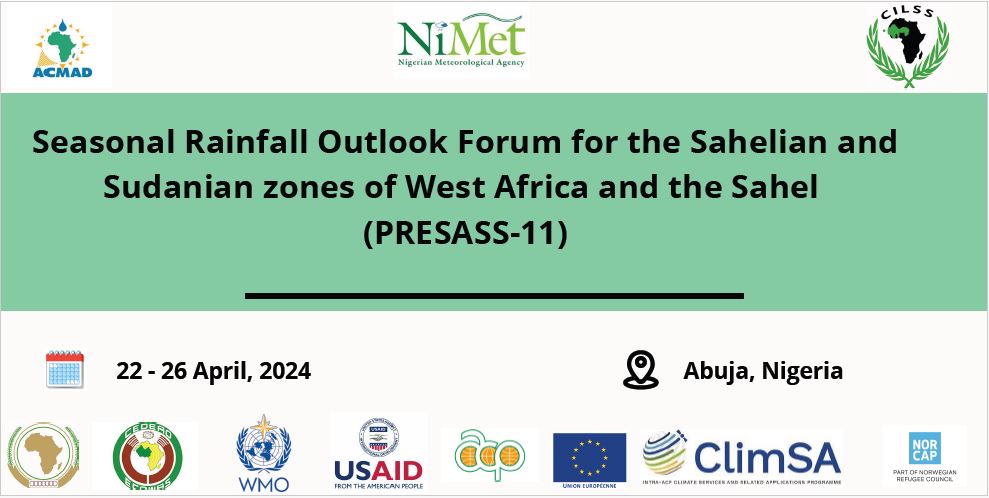PRESASS-11
DATE
22 – 26 April , 2024
Location
Abuja, Nigeria

About PRESASS-11
Sub-Saharan Africa in general is considered to be one of the region’s most vulnerable to the effects of climate variability and change, due to the fragility of its economy. The latter, which is essentially based on the exploitation of local natural resources, is highly dependent on changes in the characteristics of the rainy season. The combined effects of environmental change, demographic pressure and strong hydro-climatic variability have considerably increased agricultural risks and natural disasters.
In order to better manage these different risks, it is necessary to promote the scientific knowledge required for decision-making, while at the same time strengthening the operational systems for preventing and managing these risks.
Within this framework, ACMAD, in collaboration with the Regional Climate Centre for West Africa and the Sahel (AGRHYMET), and other partners (NMHSs, Basin Organisations, International Climate Centres, Risk and Disaster Prevention and Management Platforms and Regional User Interface Platforms, etc.) are organizing the seasonal rainfall Outlook workshop for the Sahelian and Sudanian zones of West Africa and the Sahel (PRESASS-11). This workshop session will be followed by a day of sectoral co-production of adapted information and a day of forum to share the results of the 2024 seasonal forecasts with users, intermediaries and decision-makers.
The main objective of the workshop is to strengthen the capacities of national services through the co-production of agro-hydroclimatic forecasts for the reduction of vulnerability.
More specially:
- Strengthening participants’ capacities in techniques for analyzing and characterizing agro-hydro-climatic risks in relation to the rainy season for the Sahelian and Sudanian zones of West Africa and the Sahel;
- Drawing up a seasonal forecast of agro-hydro-climatic characteristics (rainfall totals, start and end dates of the rainy season, dry spells, run-off from river basins);
- Exchange with partners, in particular with regional user interface platforms in the agriculture and food security sector and the water resources and disaster reduction sector, on the results of seasonal forecasts in order to better adapt these products to their needs and take this information into account in planning;
- Prepare and disseminate the final statement to users (producers, decision-makers and other technical partners).
EXPECTED OUTCOMES :
- Rainy season forecasts for the Sahelian and Sudanian zones of West Africa and the Sahel are produced;
- Regional user interface platforms are operational;
- Current products are adapted to user needs for more effective and targeted use ;
- A final statement on risks and specific measures to be taken to reduce risks and disasters is published.
Agenda
Program:
| Day 1: April 22, 2024 | |
| Time | Activity |
| SESSION 0: OFFICIAL OPENING CEREMONY and SETTING THE STAGE | |
| 09:00 – 09:30 | Official opening ceremony of the forumOpening remarks of the Representative of DG ACMADOpening remarks by the representative of DG AGRHYMETOpening Statement by Director General of Ghana Meteorological Agency |
| 09:30 – 10:15 | Current State of Climate over the Gulf of Guinea Region– State of ocean: observed and projected -ENSO Status, equatorial Atlantic, -Precipitation anomalies (last 90, 30, 10, 7 days) – Evolution of ITF, – State of Onset ofAgricultural Season in Sudano-Sahelian region |
| 10:15 – 10:45 | Coffe-Break |
| SESSION I: Review and Performance Assessment of the MMJ,JJA,JAS 2023 Seasonal Forecast | |
| 10:00 -11:30 | Performance of National and Regional Forecasts |
| Assessment of past and present regional and global climatic conditions | |
| Introduction of methods and tools for seasonal performance assessment | |
| SESSION II: Generation of the Seasonal Forecast: Methods, Tools and Data | |
| 11h30-12h00 | Method and tools: Introduction to the ACMAD’s 9-Steps Approach for Seasonal Forecasting |
| 12h00-13h00 | Status of global climate drivers and their likely impacts on the within Gulf of Guinea region
|
| Lunch break | |
| SESSION II: Generation of the Seasonal Forecast: Methods, Tools and Data (Ctnd) | |
| 14h30-17h30 | Analysis of climate variability and trends for target seasons
|
| 17h00-17h30 | Coffee Break and End of Day 1 |
| Day 2: April 23, 2024 | |
| Time | Activity |
| SESSION III: Introduction of tools and Applications for Climate Service | |
| 08h30-10h30 | Analysis of climate variability and trends for target seasons
|
| 10h30-11h00 | Coffee Break |
| SESSION II: Generation of the Seasonal Forecast: Methods, Tools and Data (Ctnd) | |
| 11h00-13h00 | Statistical Downscaling for Seasonal Forecasting
|
| 13h00-14h30 | Lunch Break |
| 14h30-16h00 | Statistical Downscaling for Seasonal Forecasting (Cntd) |
| 16h00-17h30 | Analysis of LRF products from GPCs
|
| 17h30-18h00 | Coffee Break and End of Day 2 |
| Day 3: April 24, 2024 | |
| Time | Activity |
| 08h30-10h00 | Production of national seasonal forecast and regional consensus
|
| 10h00-10h30 | Coffee-Break |
| 10h30-13h00 | Plenary session: Climate-Agro-Hydro experts discussion |
| 13h00-14h30 | Lunch Break |
| 14h30-15h30 | Forecasts Finalization |
| 15h30-17h30 | Drafting the statements |
| 17h30-18h00 | Coffee Break and End of Day 3 |
| Day 4: February 29, 2024 | |
| SESSION IV: Dialogue day with User Interface Platform |
| Day 5: March 01, 2024 | |
| SESSION V: Forum | |
| 13h00-14h30 | Lunch Break – End |
Contact
For more inquiries, please contact this following link: contact@acmad.org
